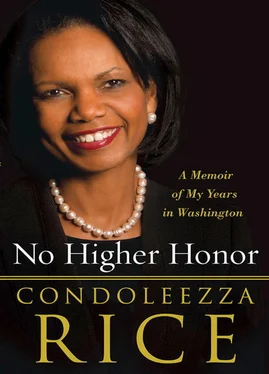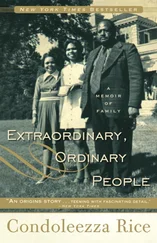I loved the pace and the sense of being a part of an adventure. Life had settled into a nice post-provost pattern, and I was quite content. When I arranged to have George W. Bush meet my father during a trip to Palo Alto in July of 1999, Daddy was hooked. He peppered me every night with questions about campaign strategy that I couldn’t answer: “How in the world did we screw up in New Hampshire? George Bush isn’t getting through to people that he is going to be a different kind of Republican. That’s what people need to know!” He admired Governor Bush and was very proud of my association with the campaign.
In February 2000 I was back home, helping to rally the troops for the California primary in the wake of the disasters in New Hampshire and Michigan. I was getting ready to do an interview with a reporter named Ann Dowd for a profile of me. Ann had gone to interview my father that morning and was in the house when suddenly my father suffered cardiac arrest. She called 911 and then my longtime assistant, Marilyn Stanley. I was in a meeting, but Marilyn burst in and said that something had happened to my father and he was not breathing. I asked my assistant Ruth Elliott to come with me, rushed out, and sped to the house. It looked like a scene from ER . Daddy was on the floor, and they were shocking his heart. I heard the medic say, “I have a weak pulse.” We all rushed to the hospital and waited. It hadn’t been a heart attack, but his heart had stopped long enough to cause what his physician called an “anoxic brain event.” Essentially, he’d been deprived of oxygen to his brain and was now in a coma. No one could say what the prognosis was.
Daddy continued in a coma for about a week and then began to stir. But he’d sustained significant brain damage. He never fully recovered, but he fought to live. Several times he was near death and refused to go. As I watched this giant of a man who’d loved me more than anyone in the world approach the end, it was hard to find much good in life. It seemed so unfair that I could no longer share stories of the campaign with my father. Here I was at the height of my professional career, and my father couldn’t enjoy it with me. Not surprisingly, my absences from home became a source of guilt, and the campaign, which had been such a wonderful magical mystery tour, became something of a slog.
I kept going and told myself that Daddy undoubtedly approved of my decision to keep my commitment to the campaign. Slowly the governor was climbing in the polls, and he clearly had a real chance to be President. But we had not erased the questions about his foreign policy competence. In fact, early in the campaign, one particular misstep created a deep hole, and it took a while to climb out of it.
I arrived at the Austin airport one November evening in 1999, and my cell phone was going crazy. It was Joel Shin, an incredibly dedicated young man who actually slept in the campaign office. (Joshua Bolten, the policy director for the campaign and later deputy chief of staff, director of the Office of Management and Budget (OMB), and chief of staff, finally made him get an apartment.) Joel asked if I’d seen the governor’s interview with Andy Hiller. I said that I’d been on the plane and hadn’t. He read the transcript. My heart sank. “Can you name the president of Taiwan?” Answer: “Lee.” “Can you name the general who is in charge of Pakistan?” Answer: “General.” “And the prime minister of India?” No answer.
“Well, that reads pretty badly,” I commented.
“It’s worse,” Joel said. “It’s on videotape and being played over and over.”
I went to the hotel but decided not to call the governor, thinking it might be better to wait until I saw him the next morning to address what we might do. That evening, he called me. “Who is the prime minister of Italy?” he asked. I laughed and thought to myself that he’d be just fine. In truth, the failure to know the names of leaders said little about the governor’s competence to lead the country. Indeed, even President Clinton said that if Governor Bush were to make it into the White House, he would “soon enough learn their names.” It was not as debilitating an issue as the press was making it out to be. Still, when we had breakfast the next morning on the patio of the Governor’s Mansion, I said exactly what I was thinking: “We’ve got to step it up.”
“I know,” he replied.
And step it up he did. We needed to fight to a draw in foreign policy so that the American people could concentrate on the governor’s qualities and domestic achievements, not on what names of leaders he knew. We picked a few key issues on which to focus—missile defense, reduction of offensive nuclear arms, and relations with emerging democracies such as India—as well as trading on his extensive knowledge of Mexico and Latin America.
Some of the senior statesmen of the Republican Party backed the governor early, particularly Dick Cheney, Don Rumsfeld, and George Shultz, who held policy seminars in his home on the Stanford campus. After the primaries, other heavyweights joined forces with us, among them Colin Powell and Henry Kissinger. The work paid its greatest dividend in the second debate against Al Gore.
In the first debate, George Bush had been a bit shaky on foreign policy, but fortunately, Al Gore’s sighing and orange makeup had obscured this fact. Moreover, there had been fewer foreign policy questions than expected. We all knew that international affairs would therefore dominate the next encounter. The afternoon of the second debate, Karen Hughes, the governor’s close confidante and communications director for the campaign, and I sat in his suite in North Carolina, going over major foreign policy questions. After a while, the tired George Bush said, “That’s enough.”
By then, though, we’d armed him with a particularly good answer on issues of global development and poverty. When the question came up, he replied that the United States is a generous country and ought to participate in significant debt relief for the poorest countries. A few days later a New York Times article noted the backing of debt relief by an assortment of leaders, including Governor Bush and the Pope. With his crisp answers on other questions—and Al Gore’s inexplicable near-catatonic state (lampooned on Saturday Night Live )—George Bush delivered the foreign policy performance he desperately needed. Foreign policy was no longer a liability.
He knew the significance of that too. After the debate I found him outside his room at the hotel. He hugged me and said, “Oh, baby!” I translated that as “Job well done.”
Florida
THE TIME after the debates passed in an instant. I flew down to Austin the afternoon of the election. By the time I arrived at the Four Seasons Hotel, the news stations were chalking up state after state in the Gore column. When I made it downstairs to watch with a few Bush friends and family, everything was going against us: Michigan, Illinois, Pennsylvania, and Florida were all gone. I sat there with Doro Bush Koch, the governor’s sister, and watched in dismay. “Let’s change places,” I said to Doro, employing a superstition from my days as an athlete and a sports fan: if your team is not winning while you’re sitting on the right side of the sofa, move to the left. Yes, I know it doesn’t matter, but it can’t hurt.
We did change places. Almost magically, NBC News reported that we’d won Georgia. Then Jean Becker, the elder George Bush’s assistant, got a call. Jean had been a reporter, and a friend from USA Today called to tell her that they were about to reverse the call on Florida. Within what seemed like minutes but was much longer, the TV screen suddenly began showing “George W. Bush, 43rd President of the United States.” It was quite a moment, and my immediate impulse was to call my father. I decided not to, fearing that he would be too disoriented to share the moment with me.
Читать дальше












